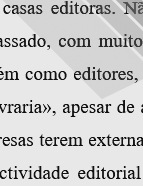

................................
Publishers' actions have a direct influence on the development of historiography. Since books are one of the main vehicles for transmitting historical knowledge, the agents who shape them also become actors in this transmission through their selection of that which is published, translated, promoted and what is rejected. And they have their own history. The focus herein, therefore, is on providing a brief overview of the publishing of history studies and sources (a small part of the publishing world as a whole) in Portugal between 1779 and 1974, considering some of the publishers' paths and the institutions that published them.
Two hundred years is a long time, and as would be expected, so are the changes. The reader has changed, the publisher has changed and the book itself has changed. In the 18th century, the book was still an artisanal object and, to some degree, a luxury reserved for a small, literate audience. And the publisher, as also envisioned today, was a non-existent figure, whose work was divided between the activity of a bookseller and a printer - often the same person. In the second half of the 20th century, the situation was different. Books were produced industrially; publishers, booksellers and printers were separate professions, with established, acknowledged boundaries. The potential audience, of course, was no longer a small elite, having widened and become more massified. However, it is also a fact that some situations had not changed at all. For example, a significant percentage of the population were illiterate, although this varied according to gender and region. In 1900, the illiteracy rate was still 78.6% and at the beginning of the century it stood at around 90% (M. M. Tavares, "Livros..." ["Books"], 1999, p. 189); according to the 1970 censuses, the percentage was 25.7%; in other words, although it had decreased, it still remained high, thus compromising the structuring of a more solid market. As it is not a separate field in the world of books, understanding how history has been published means first understanding how publishing and the role of the publisher have changed, in broad terms, over the last two centuries. The publication of history books and sources is part of these changes and continuities, in a constant dialogue between the transformations of the discipline itself, of publishing, and of the country's cultural environment.
